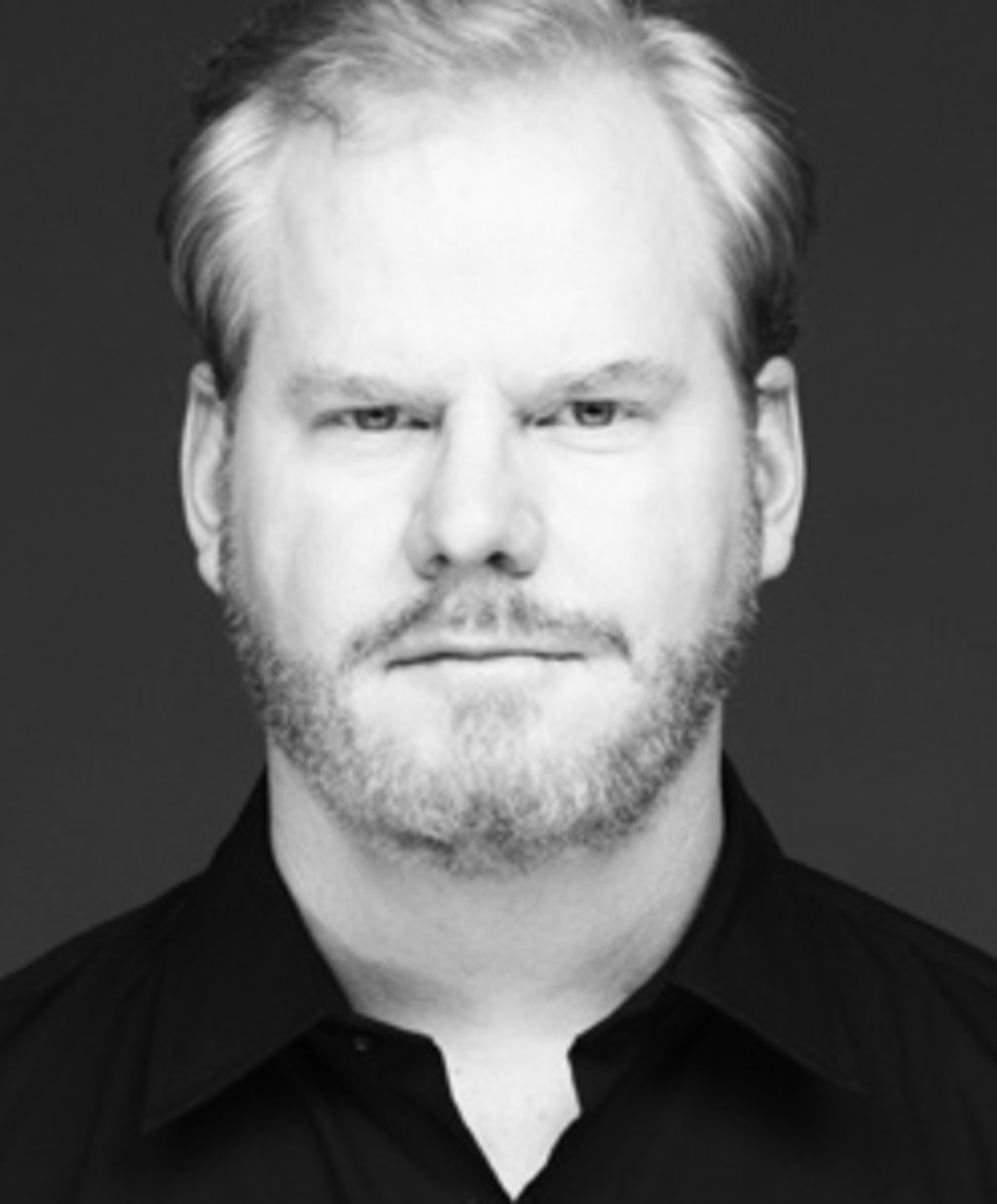 Hot Pockets, bacon, cake – oh my! Jim Gaffigan is one food obsessed comedian. With a keen sense of satire, he has an innate ability to channel our innermost thoughts on being lazy and over indulgent. And does so as a smart, relatable every man with a disarming inner voice.
Hot Pockets, bacon, cake – oh my! Jim Gaffigan is one food obsessed comedian. With a keen sense of satire, he has an innate ability to channel our innermost thoughts on being lazy and over indulgent. And does so as a smart, relatable every man with a disarming inner voice.
Jim Gaffigan – Hot Pockets (Beyond the Pale)
This week, he takes his comedic insights and food obsessions to Denver, performing back to back shows at The Temple Buell Theater on Saturday, October 6th.
“Denver is a great comedy town with great energy. You go to different cities and some just have a greater vitality. I don’t know if it’s because Denver is one of the larger, western, mountainous cities? But there’s something special about it. It has a great core personality.”
As a native of Chesterton, Indiana, Jim Gaffigan grew up idolizing Midwestern comedians like David Letterman and Bill Murray, and secretly dreamed of following in their footsteps. He attended Purdue and Georgetown University, where he earned a business degree, before relocating to New York City and honing his mild mannered, observational persona on stage.
Eventually, his career came full circle as an appearance on the David Letterman show not only connected him with his Indiana idol, but also brought about a string of television roles on “The Ellen Show,” “Sex and the City,” “Third Watch,” “That ‘70s Show,” and “My Boys.” Not to mention a starring role in the sitcom, “Welcome to New York,” where he played a weatherman from Fort Wayne, Indiana, who moves to the big apple – a show that was backed by Letterman’s very own production company, Worldwide Pants.
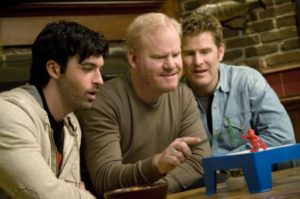 Along the way, Gaffigan has appeared in countless films: Three Kings (1999), Super Troopers (2001), 13 Going On 30 (2004), Away We Go (2009), Going the Distance (2010), etc. He’s produced animated shorts for Conan O’Brien (“Pale Force”); he’s appeared in the critically acclaimed Broadway show, That Championship Season, alongside Brian Cox, Chris Noth, Jason Patric, and Kiefer Sutherland; and he’s produced 8 comedy albums along with numerous Comedy Central specials.
Along the way, Gaffigan has appeared in countless films: Three Kings (1999), Super Troopers (2001), 13 Going On 30 (2004), Away We Go (2009), Going the Distance (2010), etc. He’s produced animated shorts for Conan O’Brien (“Pale Force”); he’s appeared in the critically acclaimed Broadway show, That Championship Season, alongside Brian Cox, Chris Noth, Jason Patric, and Kiefer Sutherland; and he’s produced 8 comedy albums along with numerous Comedy Central specials.
For his latest album, “Mr. Universe,” Gaffigan explores familiar territory, tackling offerings by McDonald’s, Domino’s, and Subway, while also sharing insights on many hilarious, non-food related topics: raising his 4 (now 5) pale white children, the joys of Disney and hotel pools, swimming to exercise and the sluggishness of whales.
In the same vain as Louis C.K. and Aziz Ansari’s online experiments, “Mr. Universe” has been released exclusively on Gaffigan’s website for just $5, $1 of which goes directly to The Bob Woodruff Foundation, providing resources and support to injured veterans and their families.
Says Gaffigan, “With stand up, there’s always this wonderful benefit of doing what you love and simultaneously, helping a charity. It’s really a good deal.”
 A good deal for sure – no doubt, super-sized.
A good deal for sure – no doubt, super-sized.
Did you always want to become a comedian?
I secretly always wanted to be one, but I didn’t know anyone that did it or was in the entertainment industry. I had done some improv classes when I was in New York and had a friend in the class who dared me to do stand up. So, I did it. And once I did it, I was addicted. It was such a great experience. Not just getting the laughs, but it was the power of going up there with something you had written and seeing the reaction. It was really empowering.
What do you remember about your first time on stage?
I remember it pretty vividly. I was really nervous. And had told one friend at work and she ended up telling a bunch of people at work. So, there were a lot of people from work there. And it was one of those things where I had memorized everything because I was so terrified. I was always the class clown, but I was never someone who felt comfortable speaking in front of a large group of people.
It was very similar to my first Letterman. It was like a blur or out of body experience where I almost felt like I was watching myself as it was happening.
Who were your earliest influences?
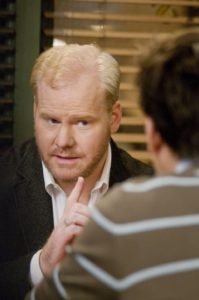 I remember watching “The Carol Burnett Show” and thinking she was hysterical. And Letterman was a big influence, of course, since we’re both from Indiana. I always looked up to him and all these guys who were from Indiana or a small town and ended up doing something in the entertainment industry because it seemed like such a mystery. It seemed like only people in New York and LA did stuff like that.
I remember watching “The Carol Burnett Show” and thinking she was hysterical. And Letterman was a big influence, of course, since we’re both from Indiana. I always looked up to him and all these guys who were from Indiana or a small town and ended up doing something in the entertainment industry because it seemed like such a mystery. It seemed like only people in New York and LA did stuff like that.
But I remember the sarcasm of David Letterman and Bill Murray being a big influence. And some of the characters that Carol Burnett and Jonathan Winters did – these likable, eccentric characters that were accessible. They weren’t mean. They were just representing the buffoonery of life.
Comedian Jim Breuer recently talked about the influence of his children on his comedy. Specifically, on his decision to go clean. How influential is your family on your comedy and why is it important for you to keep your act clean?
I wish that I could say that I kept my act clean for some higher purpose. Initially, I was never really that dirty. I would occasionally have a curse word in there, but got rid of them mostly because I found that when I was getting ready to do Letterman or Conan, I was having to take them out anyway. And it became apparent to me that (with curse words), I wasn’t done writing the joke.
My children have instilled a greater silliness on my act. A real comfort with being silly on stage. Young kids don’t respond well to the most intellectually, well thought out observations. They respond to the silliness.
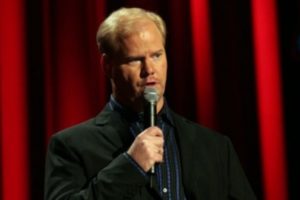 And there’s just something so innocent about a child’s point of view that we can all identify with. Like the cuteness of my 3 year old, thinking that an umbrella is actually an uncle-brella. It’s that point of view that I think is great for comedy.
And there’s just something so innocent about a child’s point of view that we can all identify with. Like the cuteness of my 3 year old, thinking that an umbrella is actually an uncle-brella. It’s that point of view that I think is great for comedy.
While I’ve been very silly at different points in time in my career, I feel that silliness is coming back because of my children. And it’s a lot of fun.
From Hot Pockets to cake, bacon to McDonalds. Where did your obsession with food come from?
Food is something that I got from my upbringing. And also, I like doing material that is universal, where everyone in the room can relate. Food is one of those things that you can talk about and everyone knows exactly what you’re talking about.
Also, I don’t want to do any material that makes someone feel horrible. I feel like there are so many polarizing issues today, culturally, that I want to be a reprieve or an escape. I like the fact that a Mormon family can be sitting next to a lesbian couple and they all like my material. Food brings everyone together.
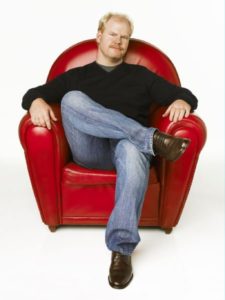 But yes, I do have an unhealthy obsession with food (Laughs). Just look at my Twitter feed. This morning, I had the thought: “Isn’t gyro meat just a form of Greek bologna?”
But yes, I do have an unhealthy obsession with food (Laughs). Just look at my Twitter feed. This morning, I had the thought: “Isn’t gyro meat just a form of Greek bologna?”
Jim Gaffigan – Bacon (King Baby)
And that judgmental, internal monologue?
I’m a bit of a neurotic person, but it’s that inner critic that we all have and we’re instructed not to give power to. I remember early on in stand up, commenting on your material was considered a bit of a no-no; particularly, developing material in New York. Being tough on stage was really important. And criticizing your act on stage, which is what Johnny Carson did, was considered weakness. It would only be fuel for hecklers.
So, it was part of something that I tried to do instinctively. And it works. For instance, I’m one of those comedians who, when people are talking in the audience, I actually get quieter. It’s a counter intuitive thing, but it really works for me on stage.
And it goes back to the whole cursing thing. It’s not like I don’t curse in everyday life, but it’s not really necessary to curse when you’re discussing sea food.
You’re very active on Twitter (and social media in general). As a comedian, do you feel pressure to be funny with every post? Or can you just post pictures of your food and kids like everyone else?
The Twitter (and social media) thing is so perfect for an observational guy like me because they are short, self-contained observations. Initially, I never really talked about being a parent in my stand up. I would actively make an effort to not be the guy who talked about his wife and kids too much because I remember when I started in stand up and saw people who talked about their wife and kids.
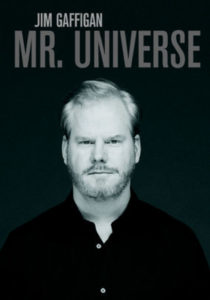 I’d be like: “I’m 26 and I can’t get a date. I don’t know what you’re talking about. Just don’t get married if you want to complain about it (Laughs).”
I’d be like: “I’m 26 and I can’t get a date. I don’t know what you’re talking about. Just don’t get married if you want to complain about it (Laughs).”
So, I saw Twitter initially as an opportunity to do material that I wouldn’t do on stage. Then, I ended up talking about my kids a lot on there. And before I knew it, based on the reaction, there ended up being material on Twitter that would end up in my act.
But it’s always changing. When I started in stand up, it was the tail end of the “MTV Half Hour Comedy Hour.” Appearing on “The Tonight Show” would change your career. And now, HBO comedy specials don’t have the same weight that they used to. Things are really changing.
Social media is just fun and silly. We all had a MySpace page and kind of look back and go, ‘Well, that was a waste a time.’
Speaking of change, instead of traditional distribution methods, your latest comedy special (“Mr. Universe”) is available exclusively online. What was your thought process behind the decision? And will your future comedy specials follow suit?
We don’t know what the business is going to be like in 5 years. It might be a completely different model that takes over? But I do like the idea of making my material as inexpensive as possible to people who enjoy it. And I imagine I’ll continue to have stuff on my website and other places too.
Now, you’re also talking to a guy who is a consumer like everyone else. Recently, I purchased a movie on iTunes for my kids and it was nineteen bucks! Part of me was like, that’s ridiculous! But then again, what else am I going to do? Thankfully, I have about 800 kids and we’ll probably watch the movie about 800 times!
 So, making my material inexpensive had a huge appeal to me. An album or special is a big tool for people to become familiar with my stuff. Even though I make most of my money touring, outlets like Comedy Central, XM Sirius, Spotify, etc. are very important for people to discover who I am.
So, making my material inexpensive had a huge appeal to me. An album or special is a big tool for people to become familiar with my stuff. Even though I make most of my money touring, outlets like Comedy Central, XM Sirius, Spotify, etc. are very important for people to discover who I am.
After all, I haven’t been on TV in a couple of years. It’s not like they are coming to my shows because I’m some tabloid fodder or I was on an Emmy winning show. It’s just nuts and bolts. They like my stand up.
Some of the proceeds from “Mr. Universe” go toward the Bob Woodruff Foundation, helping injured service men, women, and their families. How did you get involved with the foundation and why is it important to you?
On the Internet, there’s an unwritten honesty element that if my whole idea for doing a $5 download (which obviously was inspired by Louis C.K.), was motivated only because I’m annoyed that people are paying $15-20 for a movie on iTunes, it wouldn’t hold up. I don’t want people to think that I’m being greedy.
 My motivation was simply to get it out there and pass the savings on. And help some people along the way. 20% of every purchase is going to this great foundation that helps veterans and their families.
My motivation was simply to get it out there and pass the savings on. And help some people along the way. 20% of every purchase is going to this great foundation that helps veterans and their families.
The reason I chose the Bob Woodruff Foundation was because I had done a benefit with them recently. Now, I don’t come from a military family. I don’t like getting up in the morning. They probably do more work in the morning than I do all day. But I felt it was the right thing to do.
I feel as though veterans get a shaft in this country. And Bob and his wife, Lee, are lovely people. There is no bureaucracy. They aren’t motivated by titles or anything. They basically saw a specific need, partly by what Bob had gone through himself.
With stand up, there’s always this wonderful benefit of doing what you love and simultaneously, helping a charity. I do benefits all the time in New York because you get to do a set that you would be doing anyway and somehow, you’re helping out this charity? It’s a really good deal.
It’s like you’re getting ready to publish an article and they say, if you publish it here, you’ll help cancer victims. “Well, alright, I was going to publish it any way.”
How would you describe your creative process for comedy?
Ever changing. And I would say there’s an obsession behind it. I’ll find a topic and usually, it’s about food (Laughs). I always try and get all the meat off the bone and see if I can make a sandwich with it. Maybe there are some pieces I can make a soup out of? It’s really just finding a topic and looking at it from every angle.
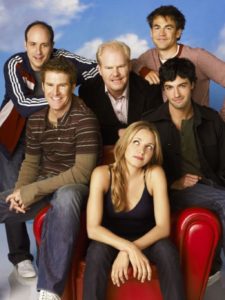 One topic might be shower goos and lotions. There’s shampoo and conditioner and body wash and there’s the viewing of what these products are, which ones are necessary, which ones are motivated by vanity, which are motivated by consumerism, etc. And finding a different approach, i.e. some of it autobiographical, some of it social commentary. Finding topics like that and really working and working it.
One topic might be shower goos and lotions. There’s shampoo and conditioner and body wash and there’s the viewing of what these products are, which ones are necessary, which ones are motivated by vanity, which are motivated by consumerism, etc. And finding a different approach, i.e. some of it autobiographical, some of it social commentary. Finding topics like that and really working and working it.
I work all of these topics together with my wife. We write everything together. It’s a unique process, I suppose. But it’s really enjoyable.
What are your current and future goals?
When I started this journey, my goal was to become a writer on Letterman. And then there was a time when I wanted to write and direct a movie. Maybe it’s because I have kids, but those kinds of things are not as appealing today.
I guess my goal now is to be open to creative things, but to consistently do quality. Creative fulfillment, i.e. doing things that are artistic, but not at the expense of the important stuff.
I don’t have any regrets, but I’m not as ambitious as I used to be. I don’t desire to be on the cover of Rolling Stone or be the number one comedian in the world. I make a good living, perform in beautiful theaters, and get to go home and fall asleep with some kids kicking me in the face.
 Of course, I would love to act more. I was in a Broadway play and loved it, but there’s nothing really gnawing at me except to be a good dad and a good husband.
Of course, I would love to act more. I was in a Broadway play and loved it, but there’s nothing really gnawing at me except to be a good dad and a good husband.
Thoughts on Denver?
Denver is a great comedy town with great energy. You go to different cities and some just have a greater vitality. I don’t know if it’s because Denver is one of the larger, western, mountainous cities? But there’s something special about it. It has a great core personality.
But in the end, I’m just this white trash guy. And I feel like Denver has a lot of white trash people, just like me (Laughs).
Mark Sells, “The Reel Deal”
 Mark Sells is a nationally recognized film/entertainment journalist and Critic-at-Large for 100.3 FM The Sound (Los Angeles). In addition to his blog on 303, you can follow The Reel Deal on YouTube, Twitter, and Facebook for the latest entertainment news, reviews, and interviews.
Mark Sells is a nationally recognized film/entertainment journalist and Critic-at-Large for 100.3 FM The Sound (Los Angeles). In addition to his blog on 303, you can follow The Reel Deal on YouTube, Twitter, and Facebook for the latest entertainment news, reviews, and interviews.
Jim Gaffigan – Mr. Universe (Preview)
